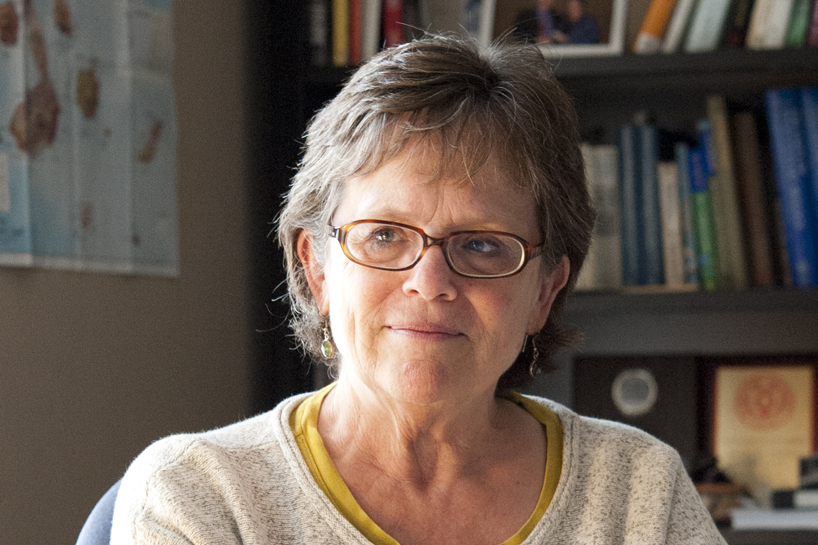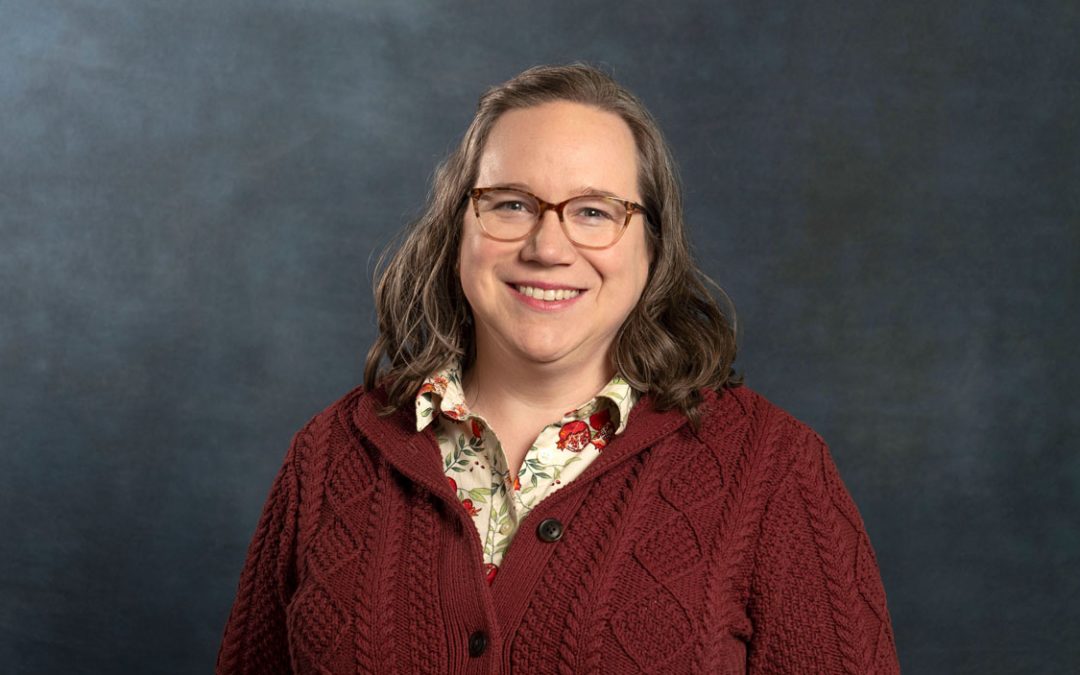
The American Ornithologists’ Union noted the more than 180 publications Des Lee Professor of Zoological Science Patty Parker has contributed to the field of ornithology in their announcement of her as the 2016 William Brewster Memorial Award winner. (Photo by August Jennewein)
The predicted “big” El Niño of 2016 petered out on the University of Missouri–St. Louis’ Patty Parker, known for her avian malaria work in the Galapagos Islands, but the year proved fruitful in other ways.
On Aug. 16, the American Ornithologists’ Union recognized the E. Desmond Lee Endowed Professor in Zoological Studies and senior scientist of Saint Louis Zoo with the 2016 William Brewster Memorial Award.
“I am honored and humbled to be listed among the recipients of the Brewster Medal,” Parker told the AOU.
Recognizing a significant career of publication, the award committee called out accomplishments in both her early work on social behavior and mating systems of vultures, wrens and a wide variety of other birds, as well as her latest Galapagos research. She studies the evolution and transmission of pathogens, including avian malaria, in the islands’ bird populations.
Parker has over 180 publications total, with more than 95 scientific papers and more than 15 book chapters on her Galapagos work alone. It’s for that island research she hoped the big El Niño might arrive this year.
“I know it sounds bad when you go, ‘Oh boy! Malaria!’” Parker said in an interview leading up to last week’s award ceremony. “But we thought this is going to be it. This is going to be the granddaddy of all El Niños, and it just petered out.”
Parker and her graduate students hoped for prime conditions to study the disease, meaning increased rains and more mosquitoes.
“Our hypothesis was that these bird populations that have malaria but that seem healthy are like people who get malaria,” she said. “As long as you’ve got plenty of food and you’re not over stressed or having a physiological challenge to your system, you can tolerate it, depending on the strain of malaria.”
But Parker and her team hypothesize that challenged systems might result in latent malaria infections flaring up in such populations. She and her team will have to wait for “better” circumstances to test the theory.
Parker’s devoted the last 15 years to studying pathogens in birds on the islands, hoping to protect the native and non-native species from the very same poxvirus and malaria parasite that caused extinctions in Hawaii in the 1980s. The research is funded in part by the Whitney R. Harris World Ecology Center at UMSL, which has for many years attracted and supported the graduate students on the project.
After starting research in 2001, the team published their first paper in 2003, and by 2009, they published the definitive results that indeed, plasmodium, the parasitic protozoa that causes malaria in its hosts, was present in the bird blood samples.
“Some of the publications are from the perspective of the bird. Some of them are from the perspective of the insects. Some of them are from the perspective of the pathogen,” she said. “There is an overarching plan to the work, but it might not be obvious from reading just one or two of the papers with narrow focus.”
Parker credits the successful research and ability to publish, and publish often, to the collaborative effort of all parties involved in the research.
“We have published a lot from our work in the Galapagos because of the nature of this work with its collaborative partnerships between the two St. Louis institutions, being UMSL and the Saint Louis Zoo, and the two Ecuadorian institutions which are the Galapagos National Park that governs the whole place and the Charles Darwin Foundation, which is an international science advisory group residing on the islands.”
With cooperation, Parker has been able to take 23,000 samples of bird blood and document the progression of the parasites in bird populations on the islands.
“We found it [the malaria parasite] first in the penguins, and then we found it in yellow warblers and in some finches,” said Parker, who added that hard-to-catch shore birds, both resident and migratory, might be the missing puzzle piece.
Currently, she and her graduate students are working on deciphering transmission dynamics.
“It’s pretty exciting because if it is relying on an introduced bird to complete its life cycle or an introduced mosquito, then there exists the possibility that we could eradicate it,” Parker said.
Springer has offered her a book deal to help gather the body of Galapagos work into one tidy summary.
“I go around giving presentations, and I summarize it, and people go, ‘Oh my gosh. Now I get it,’” she said. “So now we’re working on a book.”
Parker will submit a final draft to Springer this December with hopes of the book dropping in 2017. Another collaborative effort, each chapter is written by different partners involved in the work. Parker will contribute the introduction and conclusion.
Consisting of a medal and an honorarium, the Brewster Award was established in 1921 in honor of William Brewster, one of the founders of the AOU.
Parker intends to contribute the $1,000 honorarium to an effort to create a repository of all the bird blood samples used for the Galapagos work. It’s a dream of hers she hopes will come true.
The Brewster Award has had 80 male recipients since its inception in 1921. Parker is the ninth woman to receive the Brewster Award, the first being Florence Merriam Bailey in 1931. For more information on the William Brewster Memorial Award, click here.
Media Coverage:
St. Louis Post-Dispatch














